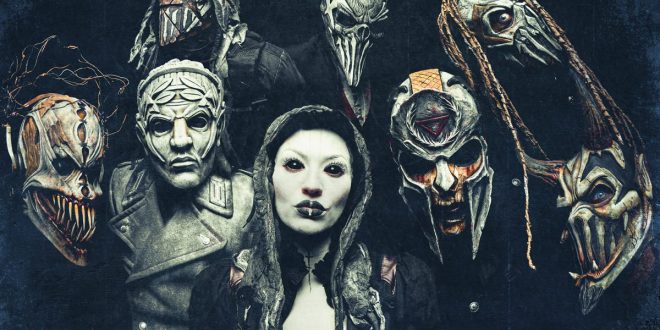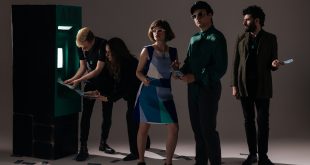For over 25 years, Cleveland, Ohio’s Mushroomhead has maintained substantial critical acclaim in both mainstream and underground circles. The octet’s distinctive branding of alternative metal music with an avant-garde, mask-based live persona continues to resonate with fans worldwide and has carried them through eight albums that have accumulated over two million sales to date. Off a five-year touring stint from the release of their 2014 album, The Righteous and the Butterfly, the band is back with their latest full-length album, A Wonderful Life. It is the first to feature current lead vocalist Steve Rauckhorst, who has served as founder Jeffrey Hatrix’s successor since 2018.
I caught up with Steve “Skinny” Felton, the band’s founding drummer, to discuss his formative years, the making of their latest album, as well as how certain music-related aspects have changed over time, both in a general sense, and in the wake of Covid-19.
Normally, I’d start off with “How’s the tour going,” but these days, how are you guys doing with quarantine?
Ahh, you know, it’s been pretty crazy, to say the least (laughs), but it’s good. We’ve just been busy working on videos mostly.
In general, you’ve kept Mushroomhead going since 1993. Before that, when you were growing up, which bands really inspired your musicianship?
When I listened to bands at that time, I didn’t think of them so much as inspiring my musicianship, but their overall production and style I really liked. For example, Kiss was a big one, and The Residents were another big one in that aspect as well. For my own band, I wanted to do something that was more than just four or five guys playing hard rock or heavy metal.
In the late 80s, you were with your brother Dave, as well as Jeffrey, in the band Hatrix. When you look back, what do you notice about that experience, when it came to finding yourself musically?
You know, it was kind of like the wild, wild west back then because you never really knew what was happening as easily as you do now, with the internet being at your fingertips. It all came down to what was happening in your surroundings – not just bands in your general area, but maybe up to six hours away. One thing that was really cool about those times was gig swapping. There would be great bands out of Detroit or Chicago, let’s say, that will come to your city and open for you, and then your band would move on to their city and open for them. Also, doing a lot of showcases, you know, the music journalism stuff at festivals like South By Southwest. Those things really stood out to me at the time, and it’s completely different now. Nowadays you can just jump online and get a good idea about what a band looks and sounds like.
With Mushroomhead, you’ve been through a lot of lineups, and up until this point, you’re the longest-running original member. How would you say your chemistry is with your current lineup?
I’d say it’s been as good as it has been with the previous guys. What a lot of people don’t realize is that every single album has had a different lineup. Change is part of Mushroomhead’s sound, but our relationships in every lineup have always been strong. Everyone’s been on the same page, and right now, we’re trying to figure out the best moves as a band without jumping on a tour, since that’s not possible. But being a theatrical band, we’re going to focus on making videos for the summer.
From what I gather, the shift in the lineups is like a revolving family. There’s no unnecessary grudges or unresolved hang-ups.
Yeah, it’s an evolution of the band. It’s a revolving project, so we’re constantly looking for new sounds. There’s no drawing a line in the sand when it comes to creativity, or to the overall sound, although it always ends up somewhat dark and creepy (laughs). But throughout all our lineups, we’ve managed to be consistent. It’s entertainment in the same sense of Star Wars versus Mortal Kombat, or Beatles versus Metallica.
I’d say so. You have your new album, A Wonderful Life, out now, which I read was five years in the making since 2014. Creatively, what went on during those years?
Actually, most of that break in between releases was spent touring. The album was written from December 2018 to January 2020, so it really wasn’t that long; it was a good 14 months. In that time, we’d managed to get a lot out of it creatively, and had come up with solid arrangements to record while on the road. For one of the tunes we did called “The Heresy,” we actually got those vocals done at Abby Road. We did a lot of different stuff for this record and captured it at several different studios. There’s even stuff we worked on in the front lounge of our bus. But going back to your question, a lot of the time we had spent was in building our presence back up in the UK, and that allowed us to get a deal with Napalm Records, who are based out of Europe. So, the album actually came together pretty fast – faster than previous albums – even though we’ve had some lineup changes. But even with those changes, we never missed a single show. Since then, it’s been a matter of keeping our eyes on the prize, and the show must go on.
Were you surprised by the outcome of everything?
I wouldn’t say I was that surprised, because when you do the work every day, progress is made, even if it’s gradual. But the transition turned out really well, especially with the new members stepping in. I was pleasantly surprised though at the reaction we’ve been getting. People are enjoying the album, but I think they’re also starting to understand where we’re going with it. It’s a bit darker and a little more artsy.
You’ve primarily handled the production aspect of your music, and for this album, you brought on Matt Wallace to mix it, who you worked with back on XIII in 2003. What’s it like working with him?
Matt is awesome. Like you’d said, we also worked with him 17 years ago on our album for Universal. For that album, we went out to California and sat with him for about five or six weeks at Larrabee Studios. We’d gotten to know the styles of music he’s into, and what he’s into besides music. He’s into pretty much everything; he’s done work with Maroon 5, Blues Traveler, Faith No More – a huge list.
But Matt’s just an incredible guy. He’s got amazing ears, and an amazing perspective on music. He’ll point us to stuff we’d overlooked, or even take liberties in loosening things around. For A Wonderful Life, we stayed home and took advantage of the technology we had, swapped song ideas through email, and he ended up mixing the whole album.
Going back to the point about the reception for this album, it’s interesting how times have changed. Back in the 80s and 90s, bands seemed to be undaunted by feedback, and wouldn’t let it sway them, whether it was positive or negative. But these days, and especially at this point in your career, the feedback you’re receiving seems to be a little more resonant, isn’t it?
Yeah, absolutely! It’s more appreciated in this world we live in. Everyone now has a platform to express why they care about a band. Whether the comments are good or bad, you struck a nerve with these people, and that’s what art is supposed to do.
I think what ultimately works for the album is its pacing. You get the heavy hitters at first, but then, as it progresses, it takes its time to experiment, and essentially pull itself back together again.
Absolutely. It does represent those peaks and valleys of life in the real world. Like you said, it has the songs that get your attention at first, and then the other songs take you for slightly deeper of a ride.
With these new circumstances, have you also recognized the value of working individually through long distance, as opposed to being all together in the studio?
Yeah. I think it’s amazing with the technology we have now, and being able to craft ideas digitally. We’ve talked about a lot of stuff from the 80s and 90s, and back then, I came up recording on two-inch tape, so my back catalog is actually full of 60 to 70 two-inch tape reels, and that was before we started storing files on hard drives. I’m absolutely loving the fact that technology is moving at the pace that it is. It’s also changed for videos. Even 20 years ago, you’d have to have a helicopter to get certain shots, and now you have a drone, you know?
Up to the 2000s, it seems like production standards had reached a saturation point where the product sounded too slick and too processed. But in the later 2010s and now in 2020, we’ve seen many more production styles making a comeback. Do you see your music as something that maintains that rawness?
Yeah, and that’s something we were always aware of, to not make ourselves sound stale. We’re coming off a very ‘copy-and-paste’ age, and I don’t want anything sounding copied and pasted at all. We always try to add a little bit of variance between the verses and choruses, and there have been times where I’d listen to other people’s songs and think, “That’s a copied and pasted drum fill” (laughs). When you paste the same fill somewhere else, you take all the life out of it. So, we’ve always made note of that, and have wanted to stay as raw as possible.
With all that you’ve been through in Mushroomhead, what have you learned about yourself, as a musician and a person?
Over the years, I’ve learned to separate the artist from the producer, and I think I’ve gotten much better at that. You look at things a little differently when you’re on each side. I’ve learned to have patience with not only myself, but the others in the band. As I’ve gotten older, I realize that the key is to listen through everyone’s ideas, find the things that I do like about them, and champion those aspects. To be able to say, “Hey, that part’s kickass; let’s work with that some more,” whereas 10 years ago, if there was something I didn’t like, I would say, “That part sucks; fuck that; get that outta here.” It’s all in the approach. You know, I’m an artist, I hold my ideas true to heart, and sometimes get emotionally attached to them. My biggest hurdle has been the patience game, but I’m getting better at it.
Lastly, anything you’d like to say to your fans?
Whether you’ve listened to us for the last 27 years or the last 27 minutes, I can’t thank you enough. None of this would be possible without you, or all the band members I’ve collaborated with, or the record labels, or the road crew, or the festival organizers. I’m incredibly blessed and I don’t take any of this for granted.
Mushroomhead Socials:
“Seen It All” Music Video
“The Heresy” Music Video
 Music Existence Because of Music, We Exist
Music Existence Because of Music, We Exist




